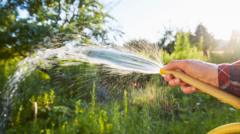Is Thames Water's New Hosepipe Ban Affecting You?

Understanding the Recent Hosepipe Ban by Thames Water
The announcement of a hosepipe ban affecting 1.1 million residents across multiple counties in the UK has raised significant concerns about water usage and conservation. Thames Water has implemented this restriction due to a combination of prolonged dry weather and an increase in water demand. This article delves into the details of the ban, its implications for residents and businesses, and offers tips on how to conserve water during this challenging period.
The Reasons Behind the Hosepipe Ban
As the summer months approach, many regions in the UK are experiencing unprecedented levels of dry weather. The Environment Agency has declared a state of prolonged dry weather in areas such as Oxfordshire, Berkshire, and Surrey. Thames Water has cited the following reasons for implementing the hosepipe ban:
- Lack of Rainfall: The significant absence of rain has led to reduced water levels in reservoirs and rivers, impacting the overall water supply.
- Increased Demand: With the temperature rising, customers are reportedly using up to 30% more water when the heat exceeds 25°C. This spike in demand has stretched supplies thinner.
- Proactive Measures: Nevil Muncaster, the strategic water resources director at Thames Water, emphasized the necessity of immediate action to manage water resources effectively.
Details of the Hosepipe Ban
The hosepipe ban will be effective starting July 22 and will affect specific postcode areas including:
- Swindon (SN)
- Gloucestershire (GL)
- Oxfordshire (OX)
- Berkshire (RG4, RG8, RG9)
During this period, residents are prohibited from using hosepipes for various activities, such as:
- Watering gardens
- Washing cars
- Filling paddling pools
Who Is Exempt from the Ban?
While the hosepipe ban targets residential customers, certain businesses are exempt. These include:
- Garden centres
- Car washes
- Any other businesses where hosepipe use is integral to their operations
Despite these exemptions, Thames Water has urged all customers within the affected areas to be mindful of their water consumption, regardless of whether they are directly impacted by the ban.
Impact on Water Resources
The hosepipe ban is not merely a precautionary measure; it reflects a critical situation concerning the region's water resources. The prolonged heatwave has resulted in:
- Lower water levels in reservoirs
- Increased evaporation rates
- Strained local water supplies
As Nevil Muncaster pointed out, the situation is unlikely to improve soon, making it imperative for residents to adopt water-saving practices.
Practical Tips for Water Conservation
In light of the hosepipe ban and the ongoing water crisis, here are some practical tips for residents to conserve water:
1. Modify Personal Hygiene Routines
Simple changes can significantly reduce water usage:
- Turn off the tap while brushing teeth.
- Take shorter showers, ideally under five minutes.
2. Optimize Household Water Use
Reassess your daily water consumption:
- Fix any leaking taps or toilets.
- Run dishwashers and washing machines only with full loads.
3. Redesign Outdoor Water Use
While hosepipe use is restricted, there are still ways to maintain your garden:
- Use a watering can instead of a hosepipe.
- Water plants early in the morning or late in the evening to reduce evaporation.
- Install a rainwater collection system to utilize natural rainfall.
4. Educate and Involve the Community
Engage your neighbors and community members in water conservation practices:
- Organize community workshops on water-saving techniques.
- Share tips and resources on social media platforms.
Long-Term Solutions for Water Management
While temporary measures like hosepipe bans address immediate concerns, long-term solutions are necessary to ensure sustainable water management in the future. Some potential solutions include:
- Infrastructure Improvements: Upgrading water supply systems to minimize leaks and maximize efficiency.
- Public Awareness Campaigns: Ongoing education about the importance of water conservation and sustainable practices.
- Investment in Water Recycling: Encouraging the development of technologies that recycle wastewater for non-potable uses.
Conclusion
The hosepipe ban announced by Thames Water serves as a critical reminder of the importance of water conservation during periods of drought. As residents in the affected areas adjust to these restrictions, it is crucial to adopt practical measures to reduce water usage. By being proactive and mindful of our water consumption, we can collectively contribute to the sustainability of our water resources.
What steps will you take to conserve water during this hosepipe ban? Remember, every drop counts! #WaterConservation #HosepipeBan #ThamesWater
FAQs about the Thames Water Hosepipe Ban
What areas are affected by the Thames Water hosepipe ban?
The hosepipe ban affects residents in Swindon, Gloucestershire, Oxfordshire, Berkshire, and Wiltshire, specifically in postcode areas OX, GL, SN, RG4, RG8, and RG9.
When does the hosepipe ban start?
The hosepipe ban will come into effect on July 22.
What activities are prohibited under the hosepipe ban?
Residents are prohibited from using hosepipes for watering gardens, washing cars, and filling paddling pools.
Are businesses exempt from the hosepipe ban?
Yes, businesses such as garden centres and car washes, where hosepipe use is essential to their operations, are exempt from the ban.
How can residents conserve water during the ban?
Residents can conserve water by taking shorter showers, turning off taps while brushing teeth, fixing leaks, and using watering cans instead of hosepipes.
Published: 2025-07-14 10:50:14 | Category: technology



